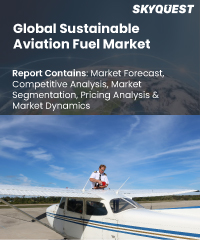
Product ID: SQMIG10D2031

Report ID:
SQMIG10D2031 |
Region:
Global |
Published Date: March, 2024
Pages:
178
|
Tables:
63 |
Figures:
77
Sustainable Aviation Fuel Market Drivers
Aviation Industry’s Pressure to reduce GHG Emissions to Bring Lucrative Growth Opportunities
Sustainable Aviation Fuel Market Restraints
Inadequate Supply of Feedstock and Refineries to Hinder Market Growth
Our industry expert will work with you to provide you with customized data in a short amount of time.
REQUEST FREE CUSTOMIZATIONWant to customize this report? This report can be personalized according to your needs. Our analysts and industry experts will work directly with you to understand your requirements and provide you with customized data in a short amount of time. We offer $1000 worth of FREE customization at the time of purchase.

Product ID: SQMIG10D2031